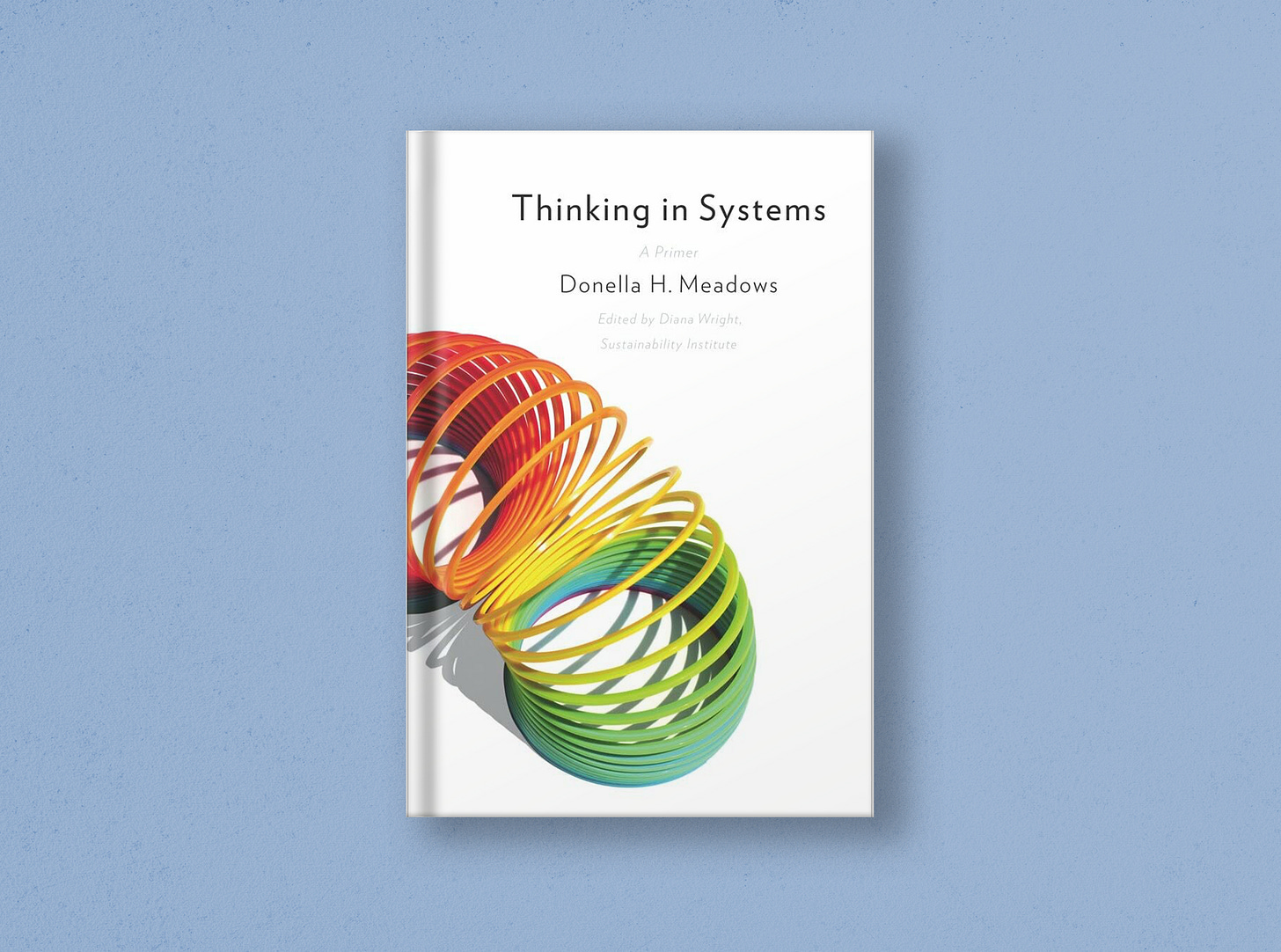⏱️ The book in three sentences
Systems thinking allows us to determine the true purpose of the infinite systems that surround us.
Understanding the systems that govern our world is the first step to changing those systems and creating the world we want to live in.
Each system is just a paradigm and therefore is not set in stone; we can choose the paradigm that fits our current goals best.
🪞 Reflections
At first thought, Thinking In Systems sounds self-explanatory, perhaps even shallow. But it's not. In fact, one does not need to read past the first chapter to see why. Systems thinking is the study of how various aspects of the world interact with each other to distribute a resource and achieve some purpose. Moreover, these aspects and interactions ("stocks" and "flows") may be physical or metaphysical, so Thinking In Systems is not a book about anything, but a roadmap to a better understanding of everything.
Meadows begins her book slowly. Taking the time required to ensure the reader holds a steady grasp on the concept of a basic system. She uses simple and real examples like the water level of your bathtub or the temperature in your house. Inflows, like those of the faucet or the heater, and outflows like the drain or your windows affect the stock of the element at hand (water or temperature). Once the reader's foundational understanding is cemented, however, the author quickly picks up speed.
Systems thinking gives birth to a number of highly complicated subject matters. Reinforcing feedback loops, information delays, and hierarchies are just some of the naturally arising phenomenons which in turn produce a number of interesting, yet intricate effects. Donella, nonetheless, swiftly and gracefully carries the reader through these complicated topics. She provides insight with simple diagrams and real-world examples ranging from your bathtub to corporate strategy, to the entire socio-economic system and the global environmental system beyond that.
Through it all, she levies a number of valid criticisms towards the short-term thinking that afflicts much of our society. Her disapproval, though, is not emotional. Given the model under discussion, her logic is sound. Furthermore, instead of dragging out her censure, she quickly jumps to solutions. Or rather, how to think so that solutions present themselves. This, ultimately, is the beauty of Thinking In Systems.
Where do systems go wrong? Are the information delays too slow? Are they too fast? Is decision-making overly centralized? Have sub-systems gone rogue? What are the limits to our systems? Have we carefully chosen them, or have they been enforced by nature? Most importantly, what are the leverage points, and where will changes make the biggest impacts?
Meadow's does not give us the answers. In fact, she readily admits to not having them. But each of the questions above can be addressed through the hierarchy of leverage points she provides in chapter 6. It's brilliant and inspiring. Whether you dream of understanding the world or of changing it, Thinking in Systems is a book for everyone.
💥 Personal impact
Thinking is Systems is almost overwhelmingly high level. It's not about an idea, it's about a framework that when utilized, produces ideas - a lot of them. As such, the foundation Meadow's lays beneath the reader's feet is not made of concrete, like any writer making an argument would strive for. Rather, it's is akin to canvas, like a trampoline, launching the reader into an entirely new world of thought. In less extravagant terms, it's triggered an unending stream of ideas in me.
Once I started to think in systems, I noticed them everywhere; from the food in my fridge to my role at work. For example, I've been thinking about systems in my life, like that of school and more specifically how we learn. At the time of writing, I'll be starting the CPA PEP program next week, so I want to create a better mental model of what it means to learn effectively.
Knowledge, I think, can act as the stock. Reading, lessons, discussions, and practice would be the inflow and forgetting would be the outflow. If my goal, therefore, is to maximize knowledge, I can obviously do that by reading more - opening up the inflows like the faucet in a bathtub. But, as the author points out, the human brain is much better at conceptualizing the effects of inflows rather than outflows. What I had never considered, therefore, was that the size of a stock can also be increased by decreasing the rate of outflow. In regards to our learning system, that would mean slowing down the rate of forgetting.
It's not that this concept is entirely new to me, nor do I expect it to be for anyone reading. If the faucet is running, increasing the volume of water in a bathtub by slowing the drainage rate is probably obvious. Now that I type it out, remembering more of what you read by not forgetting it is basically the definition of remembering. But for me, conceptualizing it as a system brings new insight into the time management aspect of studying. How much time should be allocated to increasing inflows and how much should be dedicated to decreasing outflows? If I only have 15 hours in a week for school, how much time should I spend reading or rereading, versus techniques designed to interrupt forgetting?
Fortunately, I've read another book on that exact topic - Make it Stick! I won't go into the teachings of that book in this post, but what I will say is that the takeaways from that book have found a new home, nestled within my understanding of what it means to learn. That's the effect of Thinking in Systems. Everything you know gains a whole new level of depth, and it's wonderful.
🗣 Top three quotes
A system’s function or purpose is not necessarily spoken, written, or expressed explicitly, except through the operation of the system. The best way to deduce the system’s purpose is to watch for a while to see how the system behaves. If a frog turns right and catches a fly, and then turns left and catches a fly, and then turns around backward and catches a fly, the purpose of the frog has to do not with turning left or right or backward but with catching flies. If a government proclaims its interest in protecting the environment but allocates little money or effort toward that goal, environmental protection is not, in fact, the government’s purpose. Purposes are deduced from behaviour, not from rhetoric or stated goals.
At any given time, the input that is most important to a system is the one that is most limiting...Insight comes not only from recognizing which factor is limiting but from seeing that growth itself depletes or enhances limits and therefore changes what is limiting...Ultimately, the choice is not to grow forever but to decide what limits to live within.
There is yet one leverage point that is even higher than changing a paradigm. That is to keep oneself unattached in the arena of paradigms, to stay flexible, to realize that no paradigm is “true”...If no paradigm is right, you can choose whatever one will help to achieve your purpose...It is in this space of mastery over paradigms that people throw off addictions, live in constant joy, bring down empires, get locked up or burned at the stake or crucified or shot, and have impacts that last for millennia.



